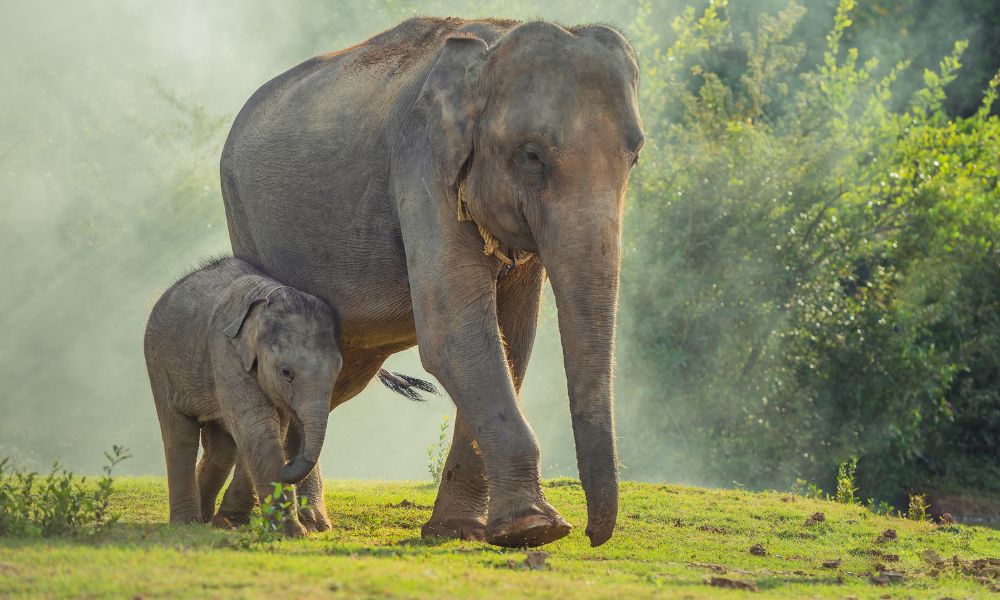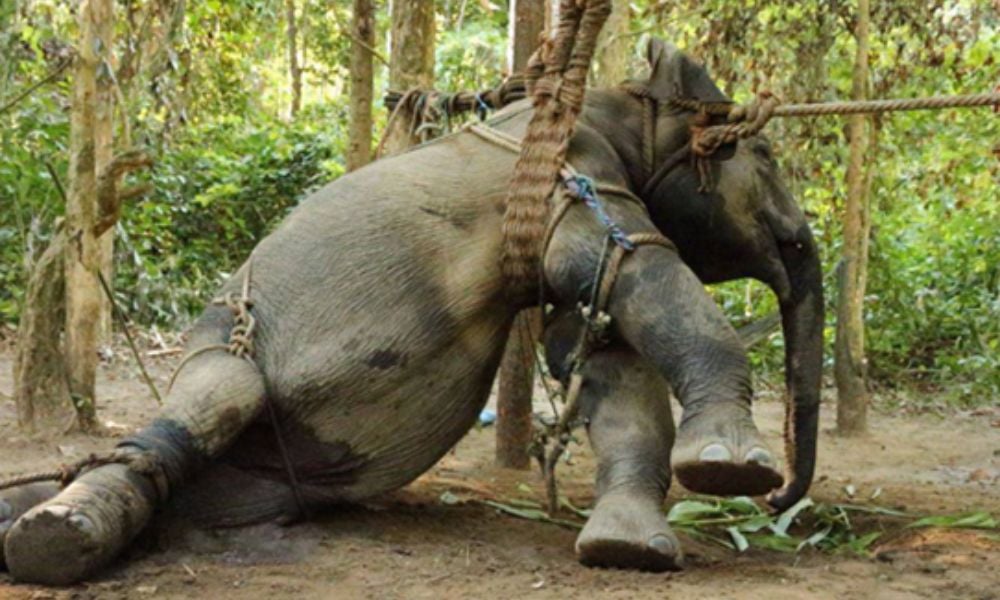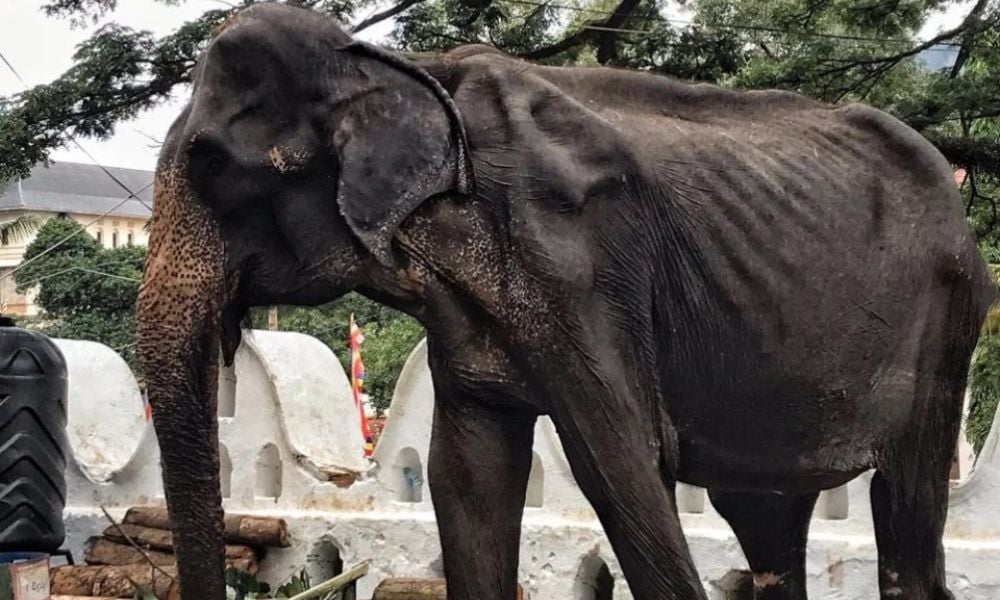Travel companies that promote unspeakably cruel activities, such as trophy hunting, riding elephants, and photo opportunities with baby monkeys, could be prohibited from advertising in the United Kingdom under monumental new regulations in the Animals (Low-Welfare Activities Abroad) Act. Duncan McNair, an attorney as well as founder and CEO of Save the Asian Elephants (STAE), is working to ensure this happens.
McNair joins a coalition of roughly 200 organizations working to strengthen the act to better protect animals abroad from suffering.
Indeed, there is a long list of tourist attractions and activities that endanger animals. Lady Freethinker (LFT) has investigated such attractions firsthand, including a zoo in Thailand where endangered orangutans are forced to “box” for people’s entertainment, and others where tigers were chained and whipped. Other attractions exploit elephants, who are bred in captivity or have been stolen in the wild.
McNair, who was recently nominated as a Legal Hero of the Year by the Law Society, spoke with Lady Freethinker about his work advocating for the protection of elephants and other animals through the act.
A Q+A with Duncan McNair of STAE

Duncan McNair
Can you please introduce yourself to our readers and explain the mission of STAE?
I’m Duncan McNair, a lawyer practising litigation in the City of London. I always wanted to be involved in major animal protection causes since [I was] a little boy. It was one reason why I pursued a path to being a lawyer.
I founded Save The Asian Elephants in 2015 after my first visit to India, where I was utterly traumatised and outraged to see endangered baby elephants beaten and stabbed, screaming and crying, to “break” them for easy use in tourism – much generated in the U.K. (and U.S.). The mission was to help preserve and protect the ancient, wondrous species of Asian elephants, whose numbers have crashed spectacularly almost to no return. The aim was [a] new law to stop the advertising and sale of unethical animal tourism practices, including amongst hundreds of practices, elephant riding (which involves prior extreme brutality).
What are “low-welfare” activities and how does related tourism affect animals?
It’s difficult to define “low-welfare” as it embraces endless different brutal and unethical practices towards animals. Any activity that limits or prevents the “Five Freedoms” – freedom from hunger and thirst, from discomfort, from pain, injury, disease, from fear and distress, to express normal behaviour. Exploitative tourism treats highly sentient creatures as if they are inanimate and incapable of feelings. The unregulated, often reckless and ruthless global market often forgets this in the stampede for turnover and profit.
Is there a particular animal that comes to mind when you think about this issue?
Numerous species across every corner of the world will benefit from this Act. Take Asian elephants – complex, majestic and ecologically crucial “mega-gardeners of the forests” which they nourish and sustain. Their sad fate in tourism is to be snatched as babies from the wild, their defensive mothers killed in front of them, isolated and starved for weeks, then beaten, ripped with hooks and screamed at [until] their “spirits break” (called Pajan). One half die in the process. Their remaining lives are endured often in extreme violence, deprivation and despair.
Add to the list baby monkeys enslaved from the forests to a life of selfies and profile pics, tiger cubs just photo props then drugged and chained for life in tiny cages, “walking with lions” later sold on for “canned hunting”, dolphins and orcas in tiny featureless pools till death, ostriches seriously injured and in great pain by being ridden — all amongst those to gain from this law whose ultimate goal is to steer the market towards ethical tourism.
How do the wild animal photo-op industries feed into poaching/canned hunting?
[It’s] yet another form of unthinking commercial exploitation of defenceless animals — by some of the world’s biggest businesses. They generate a pseudo-myth that [it’s] Manly and courageous to take on a wild creature. But they’re not wild, they’re drugged, declawed, Vaseline in eyes, helpless, and [it’s] all completely uneven. The animals with whom tourists are coaxed to have selfies, play games and tricks or even to kill when cowering in a cage — for tourism fun and kicks — have no chance at all, no life, no dignity, no mercy. [It’s] cowardly but it plays to Man’s ego and vanity, especially if they can then adorn their fireplace back home with the head or pelt of the victim.
Can you please tell us about the Animals (Low-Welfare Activities Abroad) Act and what the act’s current status is?
The Act prohibits travel companies from selling or advertising attractions or activities abroad which inflict low standards of welfare on any vertebrate animals that would be unlawful if the activity was happening in England and [Northern] Ireland. We hope that Scotland and Wales will soon enact similar legislation and we are working for that now. It is already law but it needs “activity regulations” to be introduced — a long list of abusive activities that must no longer be promoted. STAE has sent these to government along with comprehensive evidence in support.
The Act is hugely important because [its] measures can be adopted by many other countries where markets in unscrupulous animal-tourism flourish. This includes the USA, Europe, Australasia — almost everywhere.
Please help STAE as we lead a huge coalition of charities in getting the Westminster government to implement these measures.
LFT applauds McNair’s work in advocating for stronger animal welfare laws – and celebrates the progress the coalition has made in making this act U.K. law. You can join in the effort to help animals by telling your local lawmakers you would like to see similar legislation passed, and by vowing to never participate in activities that harm animals for “entertainment.” Some of the activities listed in the regulations McNair is proposing are based in the United States — including rodeos and marine animal attractions. By speaking out against these cruel attractions, we can build a more compassionate world for animals.
Learn more about how to help STAE here or email them at [email protected].









